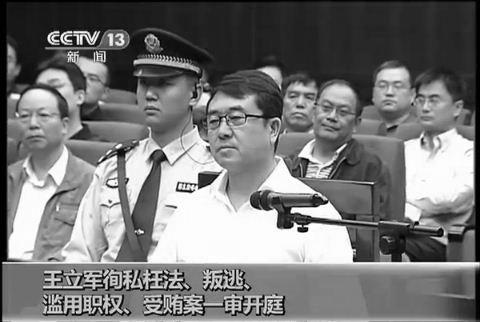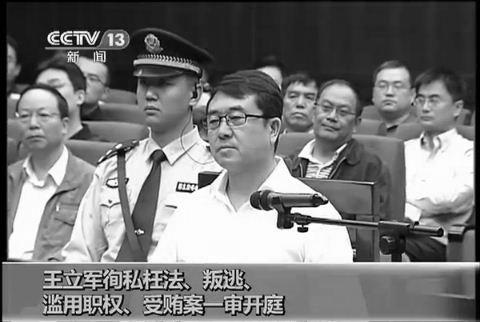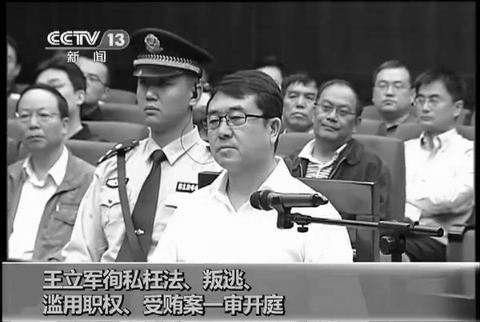The day after the trial of former Chongqing police chief Wang Lijun in Chengdu, Sichuan Province, Chinese regime mouthpiece Xinhua published a long article titled “Details of the Wang Lijun Trial.”
The Sept. 19 article referred to Bo Xilai, the disgraced Politburo member and former Party chief of Chongqing as “the leading official of the Communist Party’s Chongqing Committee.” Although it didn’t mention Bo’s name, it put him in the spotlight again.
Slap in the Face
Xinhua’s report said that on Jan. 28 Wang Lijun reported to the then “leading official of the Communist Party’s China Chongqing Committee” that Gu Kailai was highly suspected in murdering British businessman Neil Haywood, and on the next day Wang was “angrily rebuked and slapped in the face by the official.”
The report also said that Guo Weiguo, then deputy chief of the Chongqing’s Public Security Bureau, who was present when Wang was slapped, said, “the conflict was made public after Wang Lijun was slapped.”
Xinhua also said that Wang produced important clues that exposed “serious offenses committed by others” and played a key part in the investigation of those cases, which could be considered as major meritorious service.
Crimes Not Mentioned
Xinhua’s report tried to send the message that Wang Lijun didn’t really intend to cover-up the crime committed by Gu Kailai, and that he was forced to cover it up, according to Heng He, a senior political analyst with the Chinese broadcaster New Tang Dynasty (NTD) Television.
“It implied that Bo should take responsibility for the incident,” Heng said.
It described details of Wang’s crimes of defection, bribe-taking, abuse of power, but omitted the most serious crimes that Wang committed, including forced organ removal from prisoners of conscience, Heng added.
“Wang founded a psychology research center in Jinzhou, Liaoning Province,” Heng said. “The center carried out thousands of organ transplants, and was also involved in live organ harvesting from Falun Gong practitioners.”
“In addition, Wang carried out the ‘hit black’ campaign—cracking down on criminals—with an iron fist in Chongqing. Most of the cases he created involved a lack of due process, and torture was the standard means to get a confession.”
Another crime committed by Wang was his alleged raping of female police officers. “One witness came out and said that Wang set up a female police team, and he raped some female police,” Heng said.
Bending the Law
Heng He also commented that Wang’s crimes of “bending the law for selfish ends” and “abuse of power” point to Bo Xilai. “It therefore left the door open for what will happen to Bo Xilai.”
Reuters reported earlier that Xi Jinping, the presumptive next leader, said he is “'no friend of Bo,” and that Bo’s case would be handled strictly according to party discipline and state law."
Fang Linda, a commentator for The Epoch Times, said that the Xinhua piece and the Reuters report implied that top Party leaders are likely to impose a heavy sentence on Bo.
Xinhua’s report said that Wang produced important clues that exposed serious offenses committed by others. Fang said that “others” might include Bo Xilai or even Zhou Yongkang, and “serious offenses” might include a coup attempt or the live organ harvesting.
Other Secrets
Wang’s lawyer Wang Yuncai told the New York Times that Wang defected “because his life was under threat.”
Wen Zhao, a political commentator for New Tang Dynasty Television, pointed out that there might be more secrets behind this.
According to Wen, Wang worked under Chongqing’s Party chief Bo Xilai and the central government’s security apparatus, Political and Legislative Affairs Committee (PLAC). Supposing that Wang was threatened by Bo, why did he not report it to the PLAC?
“The most reasonable explanation is that Wang knew that Bo was backed by a powerful individual, which is Bo’s political ally and the head of the PLAC--Zhou Yongkang.”
“Then, what is the relationship between Bo and Zhou in terms of mutual interest? Why did Zhou try to protect Bo against all odds?”
The Epoch Times reported earlier that since 1999, the PLAC has used public security and the legal system to persecute Falun Gong practitioners.
Since 2006, many witnesses and evidence have exposed the PLAC as the key organization behind forced organ harvesting from Falun Gong practitioners. When Bo was the governor of Liaoning, Falun Gong practitioners in that province were persecuted to a particularly severe extent. Zhou and Bo have been sued for crimes of torture and crimes against humanity by Falun Gong practitioners in 13 countries.
Xia Xiaoqiang, a Washington-based columnist on Chinese affairs, predicted that Bo Xilai will be on trial before the 18th Party Congress.
Editor’s Note: When Chongqing’s former top cop, Wang Lijun, fled for his life to the U.S. Consulate in Chengdu on Feb. 6, he set in motion a political storm that has not subsided. The battle behind the scenes turns on what stance officials take toward the persecution of Falun Gong. The faction with bloody hands—the officials former CCP head Jiang Zemin promoted in order to carry out the persecution—is seeking to avoid accountability for their crimes and to continue the campaign. Other officials are refusing to participate in the persecution any longer. Events present a clear choice to the officials and citizens of China, as well as people around the world: either support or oppose the persecution of Falun Gong. History will record the choice each person makes.
The Epoch Times publishes in 35 countries and in 19 languages. Subscribe to our e-newsletter.
Click www.ept.ms/ccp-crisis to read about the most recent developments in the ongoing crisis within the Chinese communist regime. In this special topic, we provide readers with the necessary context to understand the situation. Get the RSS feed. Who are the Major Players? ![]()




